The year in review at Harvard University
When Lawrence H. Summers settled into Massachusetts Hall on July 1, he opened a year that saw achievement and glory, inquiry and debate, exhilaration and more sadness than any of us could imagine.
In the laboratory, on the playing field, and in the classroom, accolades and honors rained on Harvard, with Rhodes and Marshalls and MacArthurs and Ivys rewarding excellence in all arenas. The University attracted bright talent, including two new deans and a provost, and broke ground with research from all disciplines. Harvard closely examined how it paid its workers, graded its students, and adjudicated discipline. The University extended its reach beyond Harvard Yard to forge partnerships with our host communities and to understand the shrinking world around us.
When classes began on Sept. 12, few among us could imagine a world not permanently darkened by the previous day’s events. And indeed, Sept. 11 cast a long shadow over this past year.
Yet the Harvard community galvanized, turning inward for solace, support, understanding, and faith. We responded, marshaling our expertise to illuminate terrorism, globalization, Islam, anthrax. We reassessed and reprioritized, examining choices about our faith, our finances, our futures.
And remarkably, as the year progressed, we prevailed with the business of the University, what Summers, in an address at Morning Prayers on Sept. 21, called “the important work of learning and teaching, thinking and discussing.”
By Beth Potier
Summer 2001
- Lawrence H. Summers takes office as Harvard’s 27th president. (July 1)
- The Cambridge-Harvard Summer Academy, a five-year, $1 million commitment of Harvard resources to public education in the city of Cambridge, adds 40 intern teachers from the Harvard Graduate School of Education to summer school faculty at Cambridge Rindge and Latin School.
- Daniel Branton, Higgins Research Professor of Biology; Jene Golovchenko, professor of physics and applied physics; and Professor of Materials Science Michael Aziz discover how to move atoms across a surface with such precision they can detect particles as small as a single molecule of DNA, opening the way to making instruments capable of sequencing a person’s genes in a doctor’s office.
September 2001
- Immediately following the Sept. 11 tragedy, Summers pledges $1 million and joins with the American Council on Education to raise scholarship funds, on behalf of higher education, for the children and spouses of the victims of the terrorist attacks.
- Researchers at the Medical School and Beth Israel Deaconess Medical Center in Boston find a way to strip bacteria of their resistance to antibiotics.
- Harvard School of Public Health Assistant Professor Frank Hu is lead author of a New England Journal of Medicine paper that links a combination of lifestyle behaviors such as poor diet, lack of exercise, smoking, and abstinence from alcohol to an increased risk for type 2 diabetes among women.
October 2001
- Summers appoints Alan Stone, vice president for public affairs at Columbia University, as vice president for Government, Community and Public Affairs at Harvard University (Oct. 2).
- As U.S. schools face crisis-level teacher shortages, researchers with the Graduate School of Education’s Project on the Next Generation of Teachers find that new teachers are older than commonly perceived and are less likely to make teaching a lifelong career.
- In a two-day celebration that includes arts performances and academic symposia, Lawrence H. Summers becomes Harvard’s 27th president. The formal installation, on Oct. 12, brings Harvard faculty, students, staff, and visiting dignitaries and academics to Harvard’s Tercentenary Theatre.
- Researchers at the Forsyth Institute of the School of Dental Medicine are ready to test a vaccine on babies that prevents cavities.
- The Harvard women’s tennis team captures the 2001 Eastern Collegiate Athletic Conference Division 1 Championship (Oct. 14).
- The family of Robert G. Stone Jr. ’45, senior fellow of Harvard College, endows the crew coach position (Oct. 15).
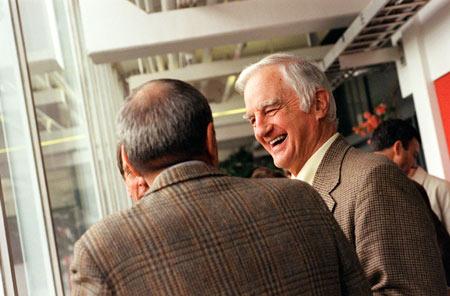
- The Derek Bok Center for Teaching and Learning celebrates its 25th anniversary (pictured), on Oct. 19.
- The School of Public Health hosts a two-day symposium about bioterrorism on Oct. 25 and 26. The School is designated a Centers for Disease Control and Prevention National Center for Public Health Preparedness, charged with providing bioterrorism defense training to public health practitioners at many levels.
- Through the discovery of the binding protein on the surface of human cells that the anthrax bacterium uses to launch an attack, R. John Collier, the Presley Professor of Microbiology and Molecular Genetics at Harvard Medical School, and co-workers identify a possible target to fight the deadly infection.
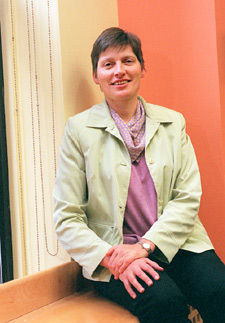
- Harvard physics professor Lene Hau (pictured), who performed the stunning feat of stopping light, wins a MacArthur Fellowship (Oct. 24).
- Summers appoints Steven E. Hyman, former professor of psychiatry at Harvard and director of the National Institute of Mental Health (NIMH), as provost of the University (Oct. 29).
November 2001
- The Harvard football team beats Yale (pictured), on Nov. 17 to claim its first unbeaten, untied season since 1913.
- Former U.S. President Bill Clinton visits Harvard, telling an enthusiastic crowd of about 5,600 in the Gordon Track and Tennis Center that we are “engaged in a struggle for the soul of the new century” and need to ensure that globalization’s gains are spread more broadly. The visit also includes a stop at the John F. Kennedy School of Government’s ARCO Forum and a private meeting with Summers (Nov. 19).
December 2001
- Harvard leads the way in Rhodes Scholars with five Americans, bringing Harvard’s total to 300 Rhodes Scholars from the United States. Another student, from Zimbabwe, wins an International Rhodes Scholarship, as does a student from Canada. Two students win Marshall Scholarships.
- Dario Fauza and Amir Kaviani, researchers at the Harvard-affiliated Children’s Hospital, grow tissue from fetuses and use it to correct birth defects after the child is born.
- In a milestone of the progress that science has made so far in devising logical therapies for genetic disease, a consortium of researchers led by Philippe Leboulch, HMS assistant professor in medicine at Brigham and Women’s Hospital and Massachusetts Institute of Technology, use a gene therapy to cure a model of sickle cell disease in mice.
January 2002
- Summers is joined by Boston Mayor Thomas Menino at the Tobin School in Mission Hill to honor the recipients of the Harvard After School Initiative grants, which total $400,000 for after-school programs in Boston (Jan. 9).
- Summers adopts core recommendations by the Committee on Employment and Contracting Policies (HCECP) concerning compensation and employment practices for Harvard’s lowest -paid workers. Recommendations include increasing wages for service workers, enhancing education and training programs, reopening service worker union contracts, requiring parity wages for outside contractors, and developing long-term improvements for workers on campus. The University and two of its three principal service unions completed negotiations designed to bring entry-level wages in line with the range recommended by the Harvard Committee on Employment and Contracting Policies in its final report released Dec. 19, 2001. The wage rates will apply to custodians, security, and parking workers, whether employed directly by the University or by outside contractors. Beginning July 1, 2002, the majority of on-campus workers in the Service Employees International Union (SEIU, Local 254), representing custodians, and the Harvard University Security, Parking and Museum Guards Union who have already received retroactive increases will again see significant wage increases, with starting rates that exceed the range of $10.83 to $11.30 per hour recommended by the Committee (Jan. 31).
- Harvard AIDS Institute, in collaboration with the Bostwana Ministry of Health, opens a new laboratory in Gabarone, Bostwana, to help combat AIDS in the nation with the highest rates of AIDS infection in the world.
- Researchers at Dana-Farber Cancer Institute find a gene that leads to obesity and may fight cancer.
February 2002
- Sarah Jessica Parker, star and co-producer of the television hit “Sex and the City,” is Hasty Pudding Woman of the Year, and actor Bruce Willis is the Hasty Man of the Year.
- Sarah Lawrence-Lightfoot, Emily Hargroves Fisher Professor of Education, is named chair of the board of the John D. and Catherine T. MacArthur Foundation.
- The Davis Center for Russian Research, the Joan Shorenstein Center on Press, Politics and Public Policy, and the Nieman Foundation collaborate with several other organizations, both Russian and American, to organize a conference in Moscow on freedom of the press (Feb. 8 and 9).
- William Clark, Harvey Brooks Professor of International Science, Public Policy and Human Development at the Kennedy School of Government, receives the prestigious Humboldt Research Award 2002.
- Matthew Meyerson, a pathologist at the Medical School, finds a way to use the results of the Human Genome Project to discover hidden germs in our bodies.
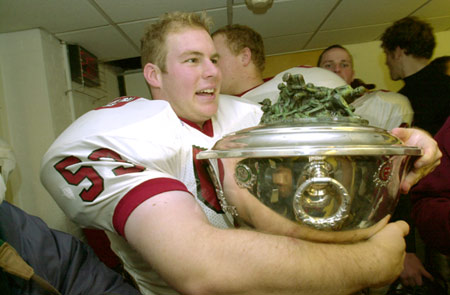
March 2002
- Women’s basketball wins the Ivy crown (March 1).
- Summers dedicates a new 60,000-square-foot, state-of-the-art laboratory facility that will house the Bauer Center for Genomics Research (March 4).
- Harvard secures a $40 million chemistry grant from the National Cancer Institute to develop a laboratory that will dramatically enhance researchers’ ability to find the proteins involved in disease and identify agents that can manipulate them.
- Charles Lieber, Hyman Professor of Chemistry, and George Whitesides, Mallinckrodt Professor of Chemistry, lead teams that make dramatic advances in nanotechnology devices, whose dimensions are measured in atoms. The devices promise new and more effective ways to compute, communicate, encode, and detect diseases. Whitesides finds ways to stimulate such small devices to assemble themselves under the right conditions.
- Peabody Museum researcher William Saturno reveals that, in a Guatemalan jungle, he has found the oldest Mayan mural.
- Gweneth Newman and Katherine Alberg Anderson, landscape architecture students at the Graduate School of Design, win the grand prize in a competition sponsored by the Massachusetts Institute of Technology and the Environmental Protection Agency to elicit creative ideas for utilizing rainwater on residential property.
- Abbe Finberg ’05 is honored at the White House by first lady Laura Bush for receiving National Achievement Award from Recording for the Blind and Dyslexic (March 6).
- Harvard Law School students take national championships in two of the field’s most prestigious competitions – the Phillip C. Jessup International Law Moot Court Competition (March 10-16) and the Association of Trial Lawyers of America Student Trial Advocacy Competition (March 21-25).
- Vera Keller ’02 is named to USA Today All-USA Academic First Team (one of 20 college students nationwide).
April 2002
- James Agee Professor of Social Ethics Robert Coles and Eileen Southern, professor of Afro-American Studies and of Music Emerita, are presented the 2001 National Humanities Medal by President Bush and first lady Laura Bush at a special ceremony at the White House (April 22).
- Harvard agrees to merge with the Rowland Institute for Science, an interdisciplinary research institute in Cambridge, strengthening and enriching the Rowland’s intellectual and physical resources and enabling Harvard to develop its research and teaching opportunities.
- Summers donates 750 books to the libraries of four Cambridge elementary schools (April 26).
- Miriam Lense ’05 is selected by the National Association for Music Education (MENC) as one of 24 winners of its student composition contest for “Introspection,” a work for string quartet.
- Charlie Cromwell ’02, a Reserve Officers Training Corps (ROTC) cadet with the Paul Revere battalion, receives the George C. Marshall award at the George C. Marshall Conference at the Virginia Military Institute in Lexington, Va. The award is presented to the top cadet in each of the nation’s ROTC programs for outstanding achievement in academics, leadership, physical fitness, and extracurricular activities (April 18).
- Summers names Ellen Condliffe Lagemann, leading historian of education and president of the Chicago-based Spencer Foundation, as the next dean of the Graduate School of Education (April 9).
- Former U.S. Secretary of the Treasury Robert E. Rubin ’60 is named a Fellow of Harvard College (April 11).
- School of Public Health researchers find that eating more fish can reduce the risk of sudden death from heart attack.
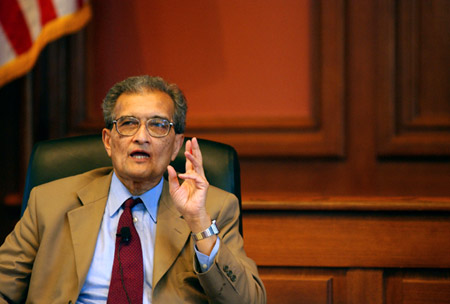
- 2002 Harvard Colloquium on International Affairs brings together Summers, former U.S. Secretary of the Treasury Robert Rubin and Nobel Laureate Amartya Sen (pictured) for discussion of post-Sept. 11 globalization (April 12-13).
- Summers addresses the Leading Industries Executive Forum at the Greater Boston Chamber of Commerce breakfast, stressing the importance of the biosciences and the “knowledge industry” to the region’s economic development (April 24).
- Harvard Business School completes Hawes Hall, named for Rodney A. Hawes, M.B.A. ’69. It is equipped with advanced technology to facilitate the dynamic interchange between faculty and students in the School’s hallmark case teaching method (April 26).
- The Harvard Islamic Finance Information Program organizes a seminar on Islamic Finance practices at the request of the U.S. Treasury Department (April 26).
- Summers and seven Harvard professors are elected members of the National Academy of Sciences (April 30).
May 2002
- John F. Kennedy School of Government faculty provide wide-ranging expertise after the Sept. 11 tragedy and convene several events surrounding issues related to terrorism. Recommendations from “Undermining Terrorism: New Concepts and Policies for an Interdependent World” are sent to the Office of Homeland Security (May 3-4).
- Daniel R. Glickman, former U.S. Department of Agriculture secretary, is named director of the Institute of Politics (IOP) at the Kennedy School of Government by Dean Joseph S. Nye Jr., (May 2).
- Researchers at Harvard-affiliated hospitals test compounds in the tissue of sea squirts, which show promise in treating cancers.
- On a trip to China, Summers announces a program established in Beijing and Cambridge to train up to 60 Chinese civil servants at the John F. Kennedy School of Government (May 12).
- Nearly 80 percent of students offered admission to Harvard College accept, the highest yield since the 1970s. A record 19,520 students applied for admission to the class of 2006, marking the 11th time in 12 years that the number of applications rose; the percentage of admitted students to class of ’06 is the lowest in Harvard’s history at 10.5 percent.
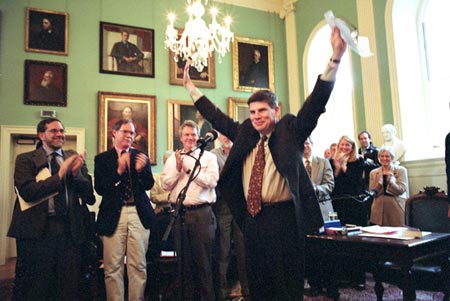
- Summers names William C. Kirby, Geisinger Professor of History and director of the Asia Center, (pictured) as dean of the Faculty of Arts and Sciences (May 20). Kirby succeeds Jeremy R. Knowles, dean of the FAS since 1991, who announced in February he will step down from the post at the end of the academic year.
- The Harvard baseball team claims the 2002 Ivy League championship and progresses to NCAA championship tournament (May 11).
- Faculty of Arts and Sciences votes to change the grading scale and to award honors degrees to a limited percentage of each graduating class (May 21).
- Faculty of Arts and Sciences changes the way the College’s Administrative Board handles cases of peer disputes ranging from theft to “date rape.” Although the standard of proof remains the same in requiring corroborating evidence, the board asks that the evidence be presented to the board before full investigations are undertaken in an attempt to make what is often an irresolvable situation less painful for students. A new form of mediation is also offered as part of that effort. Dean of the College Harry R. Lewis and Provost Steven Hyman form a committee to enhance educational and outreach efforts regarding sexual violence on campus (May 21).
- Summers, a native of New Haven, Conn., receives an Honorary Degree from Yale University (May 27).
- Summers presents the Crystal Award for Preeminence in Teaching, established by the Cambridge Partnership for Public Education to recognize and reward outstanding teachers in the Cambridge Public Schools, to three Cambridge teachers at a ceremony at the Harvard Faculty Club (May 22).
June 2002
- Three high-profile faculty members – Alphonse Fletcher Jr. University Professor Cornel West, Professor K. Anthony Appiah, and Jeffrey Sachs, Galen L. Stone Professor of International Trade and director of the Center for International Development – depart for other institutions. On balance, Harvard adds to its faculty ranks, recruiting several well-known scholars to each of its Schools.
In memoriam
- Harvard’s 24th president, Nathan Marsh Pusey, died Nov. 14, 2001, of heart disease. Pusey, president of Harvard from 1953 to 1971, presided over the University during a time of rapid growth. He was also known as a defender of universities and academic freedom against congressional critics and McCarthy Era anti-Communists.
- Don C. Wiley, John L. Loeb Professor of Biochemistry and Biophysics and one of the most distinguished structural biologists of his generation, died Nov. 16, 2001, at the age of 57.
- University Professor and philosopher Robert Nozick, one of the late 20th century’s most influential thinkers, died Jan. 23 at the age of 63.
- Sociologist David Riesman, former Henry Ford II Professor of Social Sciences at Harvard, best known for his influential study of post-World War II American society, “The Lonely Crowd,” died May 10 in Binghamton, N.Y., of natural causes. He was 92.
- Alexander Agassiz Professor of Zoology Stephen Jay Gould, Harvard’s renowned paleontologist whose groundbreaking work on evolutionary theory – coupled with his award-winning writings – brought an expanded world of science to thousands of students and readers, died May 20 at age 60.




